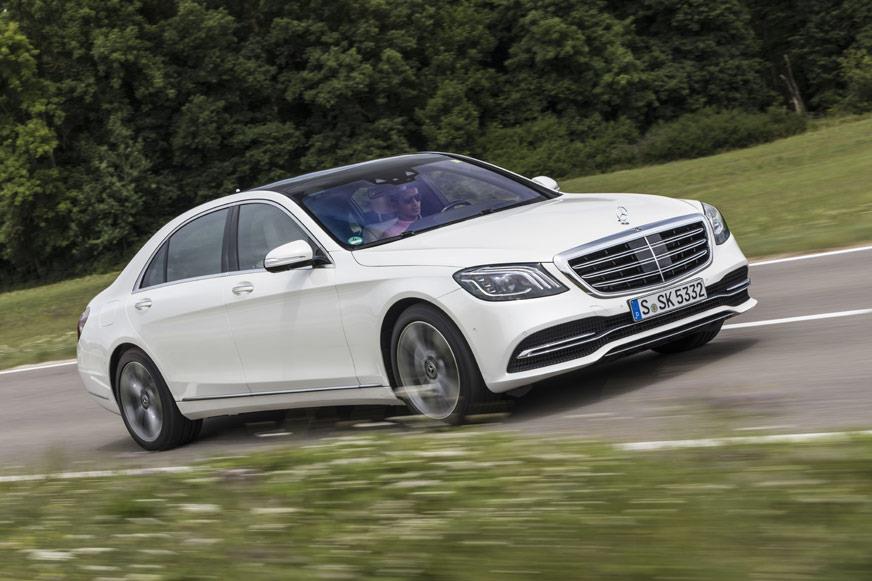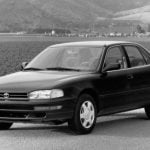
What is it?
It’s the latest version of the S-class, Mercedes’ flagship sedan – a car often referred to as ‘the Best Car in the World’. Over the years, it’s earned that name by being at the forefront of technology, comfort and luxury, and these aspects have only been enhanced on this facelifted 2017 model. What’s of greater interest, however, is that this S-class introduces a brand-new set of six- and eight-cylinder engines that will eventually find their way into the rest of the Mercedes model range.
It looks a bit different too. There’s more chrome in the grille that makes it look a bit larger than before, the front and rear bumpers are new too, also with a bit more chrome, but the biggest change are the new headlamps. They feature an all-new LED running lamp signature of three ‘eyebrows’, establishing the sedan model hierarchy (the C-class has one, the E two and now the S has three), and they’re slimmer by 25mm, which designers say was meant to make the S-class look taller and more imposing in others’ rear-view mirrors. If you like it or not is up to your taste, but personally, I feel some of the S-class’ classic elegance has been sacrificed for this more ‘techie’ look. It must be noted that all the cars we tested here in Switzerland were of the standard wheelbase, and not the long-wheelbase versions like we get in India. Additionally, they were in a variety of trim and spec levels, which again, will likely differ from the locally assembled Indian model.

What’s it like on the inside?
Sumptuous, as ever. Though the C-class and new E-class seem to have similarly designed and appointed cabins, step into the S-class and you’ll be reminded of why it’s the daddy of the range. Sure, it remains to be seen what the final trim choice is for India, but in all the cars we sampled on this drive, the quality of the wood, leather, metal and even plastic were just on another level. The dashboard design is the same as before, save for a new steering wheel with a lot more buttons, which like the car’s fascia, just doesn’t look quite as elegant as the previous one, and feels a bit too sporty for an S-class.

Among the new controls on the wheel are Mercedes’ twin mini-touchpads for the Comand infotainment system which has been updated to the new version we first saw in the E-class. That update extends to the digital instrument cluster (which, unfortunately, we did not see in the Indian version of the new E-class), and it now features three different gauge styles, sharper graphics and more information. You now get even more colours and configurations for the ambient interior lighting, push-button start is standard and there are wireless charging bays for your phone at the front and the rear. There’s also something called ‘Energising Comfort’, which unites the forces of the climate control, heated, cooled and massaging seats, perfume ioniser and even a special selection of soothing music, to work in tandem and provide a new kind of comfort zone! The S-class is now also rated as a Level 2 autonomous car, but more on that later.

The back seat has hardly changed, but then it never really had to, did it? We sampled both a ‘bench’ seat option and one that was split down the centre with a big central console, and both were incredible. Both featured two seats that offered a vast amount of adjustment and recline, and in addition to the remote that operates the rear entertainment screens, you also get a ‘handset’ that you can use while your paired mobile phone is docked in the wireless charging bay. The seats themselves offer incredibly generous cushioning and superb support, while the pillow over the headrests remains the icing on the cake. And in addition to the seats, the armrests on the sides and in the centre can be heated and cooled too.

What’s it like to drive?
This is one of the first test drives where we’ve been just as fascinated with not driving the car as driving it. As a Level 2 Autonomous Vehicle, the S-class is capable of, temporarily, taking over all the controls – steering and pedal inputs – from you. As a safety measure, you have to put your hands back on the wheel every 30 seconds or so, and once the adaptive cruise control is engaged, you never have to touch the pedals, except when negotiating junctions and roundabouts. It uses the satellite navigation to anticipate how sharp a corner is and slow the car down precisely the right amount to take it comfortably. It will even change lanes on its own with just the flick of the indicator, and it did all this with eerie accuracy on our test. Of course, none of this applies to India, as even if the radar frequency integral to most of these systems is eventually unlocked to the public in India, and if our infrastructure ever catches up to Europe with proper signage and lane markings, ours is simply too chaotic an environment for any of this to work.
So, back to driving and the new engines. The E-class’ new OM654 2.0-litre diesel enginewas the first of a new family of modular engines, but the S-class introduces the newest members; the OM656 – a straight-six diesel and the M256 – a straight-six petrol engine, which will replace the current S-class’ V6 diesel and petrol engines internationally. There’s also a new 4.0-litre twin-turbo V8 petrol engine (Code: M176), derived from the 4.0 V8 in the AMG C 63 and AMG GT S, that will replace the 4.7-litre V8 currently sold in India. All three make more power than their predecessors, while being more efficient thanks to new tech and lower weight. However, in India, we will get the straight six diesel in its lower state of tune for the S 350d, while the new petrol straight six won’t be coming at all. The petrol engine for the updated S-class will be the same 2996cc unit of today’s S 400 which is likely to be retuned for more power and re-badged as the S 450.

The 4.0 V8, however, will likely come to India unchanged, and as today will likely find its way under the hood of the Maybach S-class. What was formerly the S 500 is now called the S 560, and this is the one we spent most time with. This new 3,982cc motor uses a pair of twin-scroll turbochargers housed within the vee of the cylinder banks and produces 469hp and 700Nm of torque (10hp more than the old S 500 with the same amount of torque). It also features cylinder shut off, letting it run as a four-cylinder under low loads, and of course, engine stop-start, all for better fuel economy.

At idle and at low revs, you still get that same incredible refinement as the old engine, and as is befitting an S-class. It stays this way when you’re cruising gently too, remaining so quiet that all you can hear is some road noise from the wide tyres. However, rev it up just a little more and you’ll realise how closely it’s related to AMG’s snarling monster of a motor. You hear the growl a lot sooner this time around, and it also feels a lot more urgent. Where the old motor had a lazy, butter-smooth nature, this one is capable of whacking the car forward at a very un-limo-like rate should you prod it a little, with a claimed 0-100 time of just 4.6sec. It sounds like a proper V8 too – not quite as loud as the AMG version for sure, but still having a nice underlying rumble. The nine-speed auto is, once again, brilliant with superb smoothness and an uncanny ability to sense which gear you need at any time.

The good news is, the ‘9G-Tronic’ gearbox will now feature on the six-cylinder motors as well, unlike the current car, which still uses the old seven-speed unit for its V6s. The new six-cylinder petrol motor, which will eventually replace the ‘400’-badged V6 petrol engines in the S-class, GLE and GLS internationally, is badged either S 450 or S 500 on the S-class. It uniquely comes with some interesting tech like a separate 48v electrical system with an integrated starter generator (ISG) that works as a mild hybrid system, allowing for engine switch-off during coasting, brake energy recuperation and even providing electric boost to fill torque gaps. However, Mercedes won’t be bringing this motor to our shores, opting instead to re-tune the current S 400’s 3.0-litre V6 for more power.

We did get a brief drive in the new S 400d diesel, however. This 2,925cc, straight-six motor produces a staggering 340hp and 700Nm, but in India, we will get a less powerful version of it, called the S 350d, which will still deliver a substantial 286hp and 600Nm. The new engine makes a superb first impression. Refinement is really good, perhaps better than the current V6, but the S-class, in general, is so refined, it would take a back-to-back test to be sure. The sound it does make, however, is much nicer in the new in-line six configuration, with less clatter and more of a mechanical thrum. Power delivery is strong across the rev band on the S 400d, with a continuously growing swell of power and seemingly no let-up. If this motor is anything to go by, we will have a lot to look forward to from the new S 350d.

Ride comfort in a car like this has to be all but perfect, but then the current car already nailed this trait spectacularly, and the new one continues as before. With standard adaptive air suspension at all four corners, you get a pillow-soft ride quality that soaks up bumps really well. Yes, in Comfort mode it will float around quite a lot, but then this is a luxury limousine with zero sporting pretensions, and that’s just part of the package. If you do want a bit more body control, putting the car in Sport mode ties it down a lot better, without compromising on comfort.
Should I buy one?
When this updated S-class comes to India in the first half of 2018, it will likely launch with the new straight six diesel and the re-tuned V6 petrol, with the V8 version joining later on, along with AMG and Maybach versions too. The new engines are welcome step forward in refinement and performance, although the latter was not really required in a new S-class. Expect prices to increase a bit, which should put it in the Rs 1.2-1.4 crore (ex-showroom) range for the ‘standard’ models. In diesel guise at least, the current S-class is already our pick of the segment, and its position is likely to only grow stronger when the updated version arrives.
 However, launching around the same time will beAudi’s brand-new A8 limousine, which also promises to set new benchmarks in technology, equipment, comfort and interior quality, and along with the still-fresh BMW 7-series, is a tussle worth looking forward to. Of course, the rather interesting automated driving features that we got to sample in Zurich won’t make it to India, but even without them, the S-class remains possibly the most complete sedan for the chauffeur-driven.
However, launching around the same time will beAudi’s brand-new A8 limousine, which also promises to set new benchmarks in technology, equipment, comfort and interior quality, and along with the still-fresh BMW 7-series, is a tussle worth looking forward to. Of course, the rather interesting automated driving features that we got to sample in Zurich won’t make it to India, but even without them, the S-class remains possibly the most complete sedan for the chauffeur-driven.

| S-Class | |
| Length | 5125mm |
| Width | 1899mm |
| Height | 1493mm |
| Wheelbase | 3035mm |
| Boot space | 530 litres |
| Kerb weight | 2005kg |
| Tyres | 245/50 R 18 |

| S 400d | S 560 | |
| Type | Inline, 6-cylinder | V8 |
| Displacement | 2925cc | 3982cc |
| Valvetrain | 4 valves per cylinder | 4 valves per cylinder |
| Fuel | Diesel | Petrol |
| Max power | 340hp at 3600-4400rpm | 469hp at 5250-5500 rpm |
| Max Torque | 700Nm at 1200-3200rpm | 700Nm at 2000-4000rpm |
| Transmission | 9-speed automatic | 9-speed automatic |

Copyright (c) Autocar India. All rights reserved.
[“Source-autocarindia”]





